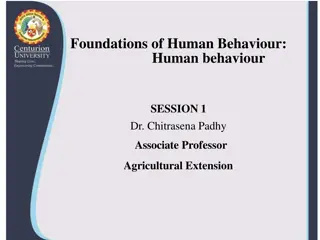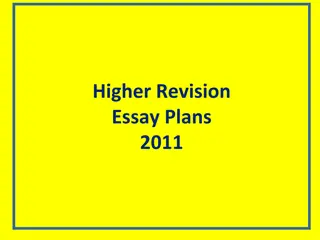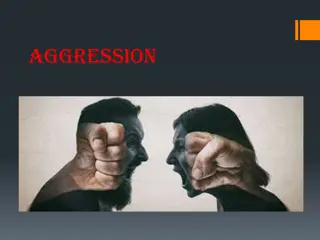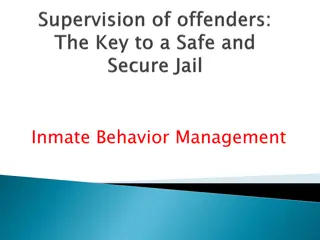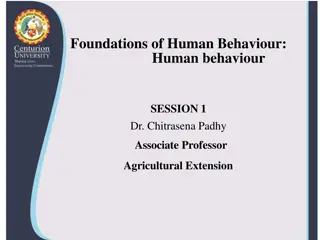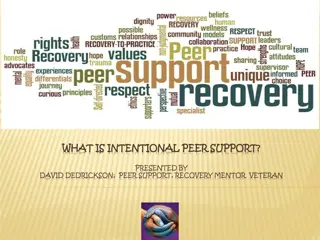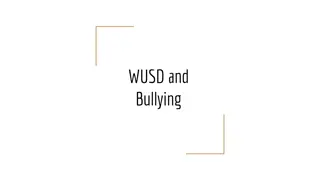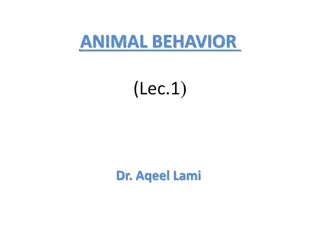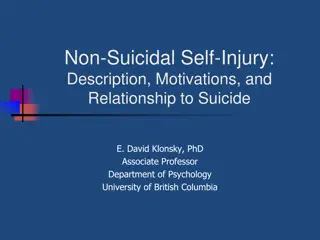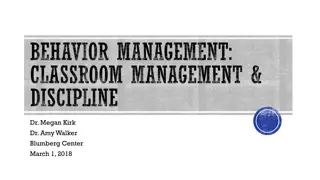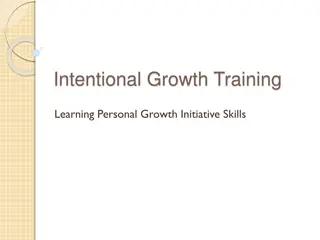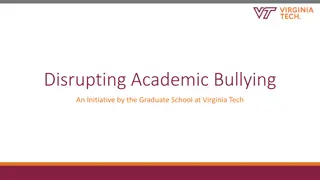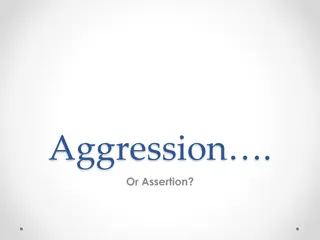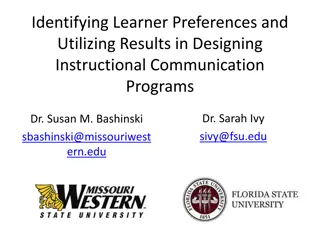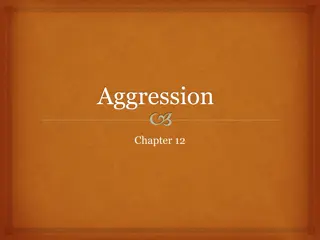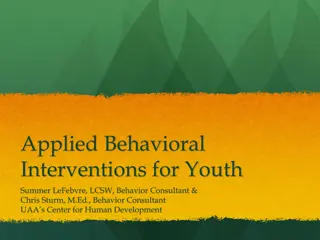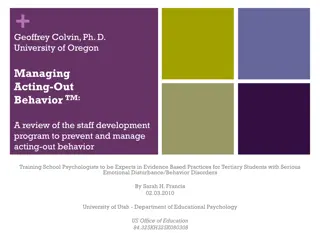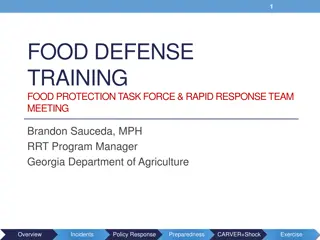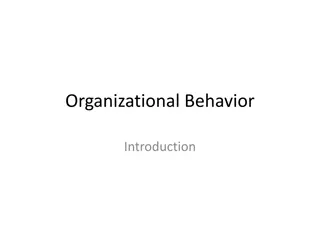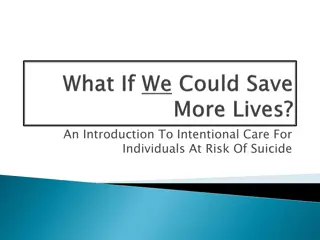Positive Behavior Support Interventions in Education
Learn about Tier 1 Positive Behavior Interventions & Supports (PBIS) developed by California State University and LA Unified School District. Explore evidence-based strategies like effective transitions, praise, choice-making, and establishing routines to promote positive behavior in students. Disco
1 views • 10 slides
Function Based Thinking
Function-based thinking in Missouri Schoolwide Positive Behavior Support, emphasizing data-based decision-making, mission clarity, and effective teaching practices. Understand how behavior is related to the environment and how environmental interventions play a key role in shaping expected behaviors
6 views • 27 slides
Understanding the Enneagram for Intentional Christian Relationships
The Enneagram is a personality system rooted in ancient Christian traditions, now widely used for understanding individual traits and behaviors in modern times. Developed from the concept of nine points representing different personality types, it is a tool to explore vices, virtues, and personal gr
4 views • 10 slides
Addressing Predatory Behavior in the Fellowship
Predatory behavior, especially towards vulnerable members, is a concerning issue in the fellowship. This behavior includes unwelcome advances, exploitation of power dynamics, and institutional sexism. The discussion on predatory behavior necessitates honest dialogue and a united approach for a safer
3 views • 13 slides
Understanding Human Behavior: Foundations and Complexity
Human behavior encompasses the actions and interactions of individuals influenced by factors like genetics, culture, and situational contexts. It involves observable overt behaviors as well as hidden covert behaviors, with a dynamic interplay between individuals and their environments. Psychologists
8 views • 20 slides
GD Bart Puppy Test: Behavior Scoring System Overview
The GD Bart Puppy Test is a standardized behavioral scoring system designed for puppies at 8 weeks of age, focusing on 21 test components to predict success in canine behavior. Conducted by a team of 3 people, the test evaluates stress signals and responsiveness levels to various stimuli. Multiple e
6 views • 15 slides
Understanding the Role of Board-Certified Behavior Analysts in Supporting Students with Autism in PA School Programs
Pennsylvania Training and Technical Assistance Network (PaTTAN) plays a crucial role in supporting students with autism through the efforts of Board-Certified Behavior Analysts. The increasing number of students eligible for IEPs under the definition of autism necessitates skilled educators who can
0 views • 20 slides
Influencing Factors on Voting Behavior: A Comprehensive Analysis
In the realm of voting behavior, factors such as media, social class, age, gender, and more play critical roles. This essay delves into the complexity of factors influencing voting behavior, assessing their relative importance and the balance of their impact. The discussion includes models of voting
0 views • 12 slides
Understanding Aggression: Causes and Solutions
Aggression is any intentional behavior aimed at harming others, whether physically, verbally, or emotionally. It can be instrumental or hostile. Biological factors like hormones and neural substrates, social/cultural factors such as frustration and provocation, and environmental/situational factors
0 views • 10 slides
Understanding Consumer Behavior in Marketing
The design of a marketing program starts with understanding consumer behavior. Consumers, as the end users, play a crucial role in shaping market trends. Producers seek insights into consumer personas, market behaviors, and influencing factors. Management focuses on the consequences of consumer beha
2 views • 26 slides
Understanding Psychology: The Science of Behavior and Mental Processes
Psychology is the scientific study of behavior and mental processes. Psychologists study both observable behavior and private mental processes. The primary goals of psychology are to describe, understand, predict, and control behavior. Different branches of psychology, such as applied psychology, cl
2 views • 29 slides
Understanding Inmate Behavior Management in Correctional Settings
Inmate Behavior Management in correctional facilities involves supervising inmates, implementing corrective discipline, and fostering a fair and consistent environment. It emphasizes the importance of behavior management plans, identifying undesirable traits in supervision, and passing educational a
0 views • 19 slides
Understanding Human Behavior: Foundations and Factors
Human behavior is a multifaceted subject influenced by genetic makeup, culture, and individual values. It encompasses both overt actions and covert thoughts, a product of the individual and environmental factors. Psychologists study behavior from visible (overt) actions like playing football to inne
0 views • 20 slides
Exploring Intentional Partnerships in Student Teaching Programs
Delve into the world of student teaching programs and the creation of intentional partnerships between preparation programs, school districts, and educators. Discover strategies, experiences, and insights shared at the WERA Preconference on December 11, 2019. From fostering supportive environments f
0 views • 22 slides
Developing Good Leadership through Character, Competence, Compassion, and Charisma
Leadership is a deliberate journey that requires developing qualities such as character, competence, compassion, and charisma. Effective leadership entails guiding oneself and others towards positive outcomes. Character is foundational, expressed through behavior and personal choices. Leadership ski
0 views • 54 slides
Enhancing Academic Proficiency and Workplace Competencies in Secondary School Learners through Consumer Studies Assessment
In South Africa, the National Senior Certificate (NSC) and the Independent Examinations Board (IEB) play crucial roles in assessing learners' academic proficiency and workplace competencies. Consumer Studies, as an elective subject, is integral in developing responsible consumer behavior and equippi
1 views • 23 slides
Understanding Normal and Abnormal Behavior: Perspectives and Definitions
Normal behavior varies from person to person and society, influenced by individual preferences and societal norms. Abnormal behavior is characterized by an inability to function effectively or personal discomfort. The concept of normality and abnormality in psychology raises complex questions about
2 views • 8 slides
Understanding Intentional Peer Support and its Importance in Mental Health Recovery
Intentional Peer Support, presented by David Dedrickson, emphasizes purposeful relationships where individuals support and challenge each other to explore new perspectives and behaviors. It involves peer-to-peer interactions based on shared experiences, offering a unique form of support different fr
0 views • 23 slides
Understanding Bullying: Behavior Differentiation and Impact
Discussing the importance of addressing bullying in schools based on statistics and the need to distinguish between rude, mean, and bullying behaviors. The content outlines examples of rude, mean, and bullying behaviors, emphasizing the intentional and repeated nature of bullying, its impact, and ex
0 views • 20 slides
Understanding Human Behavior: Insights for Social Workers
This material delves into the intricacies of human behavior, exploring factors influencing behavior such as heredity, environment, intelligence, needs, and motives. It covers the concept of human behavior, stages in life from conception to old age, and theories of human development by eminent psycho
2 views • 71 slides
Understanding Animal Behavior and Ecology
Animal behavior encompasses a range of activities such as feeding, breeding, and social interactions. Ethology focuses on studying behavior in natural environments, while behavioral ecology examines ecological aspects like predator-prey interactions. Sociobiology delves into the evolution of social
3 views • 5 slides
Understanding Non-Suicidal Self-Injury in Youth and Adolescents
Non-Suicidal Self-Injury (NSSI) is a common issue among youth and adolescents, often misunderstood as attempted suicide. This behavior involves intentional self-harm without suicidal intent, such as cutting, burning, and scratching. It is crucial to distinguish NSSI from suicide attempts due to thei
0 views • 124 slides
Understanding Behavior Management in Classroom Settings
Explore the essential topics of behavior management, classroom strategies, and discipline in educational settings. Delve into the functions of behavior, impact of trauma on learning, and effective management techniques. Learn how to identify underlying reasons for student behaviors, discuss behavior
0 views • 76 slides
Intentional Growth Training for Personal Development
Explore the concept of Personal Growth Initiative (PGI) through intentional behaviors, values, and attitudes. Discover how planning, outcomes, and reactions influence the likelihood of change. Delve into readiness for change, planfulness, and utilizing resources for active growth in a visually engag
0 views • 32 slides
Understanding Attribution Theory: Exploring Dispositional vs. Situational Attribution
Attribution theory examines how people explain behavior and events by analyzing internal vs. external causes. Heider's influential ideas on dispositional vs. situational attributions are discussed. Dispositional attribution focuses on internal characteristics, while situational attribution relates b
0 views • 14 slides
Personal Growth Training and Initiative Overview
Explore intentional growth training and personal growth initiative, focusing on active and intentional self-improvement through values, beliefs, attitudes, and behaviors. Reflect on questions related to personal growth, outcomes, changes, and readiness for change. Discover the impact of outcomes on
0 views • 32 slides
Targeting Emotions to Facilitate Behavior Change in Older Adults
Efforts in changing health behavior have traditionally focused on social and cognitive factors, but recent evidence highlights the importance of affective states in decision-making and behavior change. Janey Peterson discusses the role of emotions in achieving and sustaining behavior change to benef
0 views • 11 slides
Understanding and Addressing Academic Bullying in Educational Settings
Academic bullying involves intentional, repetitive, and hostile behavior that creates a threatening environment leading to psychological and physical harm. This initiative by the Graduate School at Virginia Tech aims to disrupt academic bullying by identifying types of bullying, defining roles, and
1 views • 13 slides
Grading Criteria for Effort and Behavior in Educational Reporting
Effort and behavior in educational settings are evaluated based on criteria ranging from Excellent to Causing Concern. Pupils demonstrating excellent behavior show respect, responsibility, and positive engagement in learning. Those with good behavior exhibit cooperation and respect for others, albei
0 views • 9 slides
Understanding the Dynamics of Aggression and Assertion in Competitive Environments
Aggression is intentional behavior aimed at harming others, while assertion is forceful yet non-harmful conduct within the spirit of competition. Factors like antecedents, perceived unfairness, and pressure to win can trigger aggression in sports. Recognizing the differences between hostile and chan
0 views • 10 slides
Understanding Learner Preferences for Effective Communication Programs
Explore learner preferences and their role in designing instructional communication programs. Learn how to assess preferences, promote communication development, and build a strong foundation for effective programs. Discover key concepts such as behavior as communication and the importance of intent
0 views • 65 slides
Insights into Aggression: Causes, Gender Differences, and Influencing Factors
Aggression is intentional behavior aimed at causing harm, with instrumental and hostile forms. Gender differences show males are more physically aggressive, while females engage in relational aggression. Aggression is influenced by situational and cultural factors, with influences from alcohol. Unde
0 views • 31 slides
Understanding Applied Behavior Analysis (ABA) for Youth Interventions
Applied Behavior Analysis (ABA) is a science focusing on improving human behavior by increasing desired behaviors, teaching new skills, and generalizing behaviors. ABA emphasizes observable behaviors, measurement of behavior change, and the use of interventions in various settings like classrooms an
0 views • 25 slides
PBIS Expectations and Behavior Flowchart
The PBIS flowchart outlines behavior expectations and interventions for minor and major incidents in a school setting. It covers disrespectful behavior, disruption, defiance, property damage, theft, possession of weapons, and more. The flowchart guides teachers and staff on managing and addressing s
0 views • 6 slides
Managing Acting-Out Behavior: A Staff Development Program Review
This review discusses a staff development program created by Geoffrey Colvin, Ph.D., from the University of Oregon, focusing on preventing and managing acting-out behavior in students with emotional disturbance or behavior disorders. The program includes video presentations, strategies for behavior
0 views • 22 slides
Intentional Endowments Network: Promoting Sustainable Investing in Higher Education
The Intentional Endowments Network (IEN) provides direct support and facilitates cross-sector collaboration for higher education institutions, non-profits, advocacy groups, investment firms, and more. Their initiatives focus on thought leadership, peer networking, and forums for presidents, CFOs, tr
0 views • 17 slides
Food Defense Training and Rapid Response Team Meeting Overview
Food Defense Training and Rapid Response Team Meeting provides insights into food security, food defense, and food safety to protect against intentional and unintentional contamination incidents. The presentation delves into incidents, policies, responses, and preparedness, emphasizing the importanc
0 views • 24 slides
Understanding Organizational Behavior and Individual Behavior
Organizational Behavior (OB) is a multidisciplinary field that combines knowledge from various disciplines to study and manage organizations effectively. It emphasizes the application of this knowledge to enhance organizational effectiveness and the well-being of participants. OB is a useful concept
0 views • 38 slides
Function-Based Behavior Support Plans: A Comprehensive Guide
Explore the process of developing Function-Based Behavior Support Plans (BSP) using Functional Behavioral Assessment (FBA). Understand the concepts of function and functional behavior assessment, learn how FBA/BSP fits within a multi-tiered support system, and practice developing BSP for students. D
0 views • 74 slides
Understanding and Addressing Suicide Risk: An Intentional Care Approach
Over 42,000 Americans die by suicide annually, highlighting the critical need for intentional care strategies. The statistics reveal concerning trends, emphasizing the importance of targeted interventions in mental health and primary care settings. Licensed clinicians often lack the necessary skills
0 views • 15 slides




